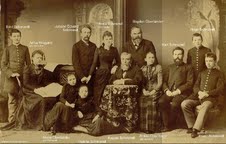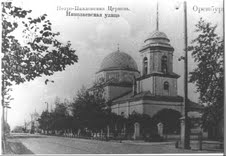The Younger Years of New Martyr Alexander Schmorell
 |
The Schmorell family in Orenburg |
Alexander Schmorell was born in the city of Orenburg, Russia, where he spent the first several years of his life. His grandfather, the German merchant Karl-August Schmorell, became the first from his family to live in Russia. Hailing from Prussia, he moved to Orenburg at the age of 23. Settling down, he set up a fur shop, Lavka Schmorell, on Nikolaevsky Street in the center of the city. In 1879, Karl August invested in a new venture: he built the first steam-powered lumber mill in Orenburg. Some of his compatriots already had businesses in the city. They were almost all famous and well-respected in society. Klump, Fokerodt, Oberlender, Hoffman, these names were for decades connected with Orenburg. Some of these relative newcomers obtained Russian citizenship, some remained loyal to the German government, but they all felt that they were Orenburgites, and helped the city flourish. As a rule, their background and religion, and their belonging to the merchant class, as well as their prolific breeding�with some having ten or more children�resulted in many families being interrelated.
Karl August�s ten children set firm roots in Russia. One of them, Franz, was even elected Deputy Head of the Orenburg Municipality. Yet World War I was to disrupt the neighborly good will for the Germans of Orenburg. A friend of the family, the wealthy Orenburg entrepreneur Oberlander, had paid for Hugo Schmorell to go to study in Munich. In 1907, he defended his doctoral dissertation with distinction. Returning to Russia, Hugo Schmorell worked as an assistant to the chairman of the internal medicine department of Moscow State University.� But World War I broke out, mobs stormed German-owned shops, and some of Schmorell�s colleagues requested that this �German spy� be expelled. Alexander Schmorell�s father Hugo Karlovich was forced to leave the city. His Russian bride, Natalia Petrovna Vvedenskaya, went to Orenburg with him, where they were soon married. In September 1917, they had a son, whom they named Alexander and baptized into the Russian Orthodox faith. Alexander adhered to his religion into his adulthood, even later when he moved abroad. In 1918, his mother died of typhus, and a nanny needed to be found for the boy. Sometime later, Hugo Karlovich met the German head nurse of the clinic where he worked after the Revolution, and in 1920 married her.�
|
|
|
With the nanny Feodosia Lapshina
|
Elizaveta Egorovna Hoffman was the daughter of the owner of a brewery. Her father Egor (Georg) Hoffman, from a family of brewers, lived in Bavaria until the mid-19th century. He mastered his craft, but as the second son, had no chance of inheriting it. According to his descendants, Hoffman once saw an advertisement seeking a brewer to work in Orenburg. He sold his gold watch, bought a train ticket, and, like Schmorell, departed to a distant city in a foreign land. After the death of Klump, his Russian employer, Hoffman gained genuine popularity among the locals. His inherited knowledge of the art of brewing inspired him to join forces with a fellow immigrant from Bavaria, Ludwig Bamberger, to launch a new company in 1902, called the �Association of Steam Brewers EE Hoffman & Co (formerly Klump) of Orenburg.� In a few years, however, the Revolution destroyed the plans of this promising endeavor.
In 1921, the Schmorells left Russia. Dr Schmorell had no doubt as to where he would go. Munich, well-known to him from his years as a university student and subsequent visits, seemed a possible haven from the revolutionary upheaval of Soviet Russia. Alexander�s brother Erich and sister Natasha were born in Munich. Their nanny accompanied them on their move to Germany. Feodosia Lapshina, a peasant woman from Saratov guberniya was �baptized� Francisca Schmorell, and as a family member was able to live with them. The Russian nanny of �Shurik,� as Alexander was known at home, came to replace his late mother. Alexander grew up bilingual, speaking Russian and German with equal fluency, sensing himself both Russian and German. Even after leaving Russia, the Schmorells preserved their Orenburg traditions: lunch included pelmeni and blinchiki, a samovar was always on the table, and no one considered that simply a nostalgic holdover. His parents spoke Russian at home. The children easily learned German from their friends. Shurik took Russian lessons from the local Orthodox priest. Later, the Schmorells would be visited every week by a Mr Nalbandov, who taught them Russian. Erich recalled with pleasure how they read Tolstoy�s War and Peace and Pushkin�s Eugene Onegin to him. The younger Schmorells remained devoted to books throughout their lives, especially the Russian classics. �
A circle of friends soon formed around the family. These were mostly Orthodox clergymen, people of culture and art and from the medical profession. The Pasternak family members were frequent guests. The impressionist painter Leonid would come with his wife, the renowned Moscow pianist Rosalia Kaufman. Leonid gave his friend Hugo a pencil drawing of Beethoven with an inscribed dedication, which even now hangs above the piano in Erich Schmorell�s living room. Later, Lidochka and Zhenechka would come for tea; they were the sisters of Boris Pasternak, who remained in Russia and gained world fame for his novel Doctor Zhivago.
 |
SS Peter and Paul Church in Orenburg, where Alexander was baptized |
Alexander�s childhood included the usual schooling, but also participation in youth organizations. For Munich youth in the 1930�s, such organizations offered adventure, hikes and songs around the campfire. In 1933, the �Young Bavarians,� which included the Schmorell boys, became a Hitler-jugend [Hitler Youth] group, while the �Steel Helmet,� which included the older members, were reorganized into the SA, or Sturmabteilung [Storm Troop]. Erich was accepted into the Hitler Youth, and �Alex� into the SA, but in March 1934, they learned that Shurik was too young, being only 16, so he was �returned� to the Hitler-jugend. Alex was devastated that he was treated like a little boy, and tried several times to return to the SA. He especially liked the cavalry divisions. He finally succeeded, but soon disenchantment set in. Schmorell and many of his friends were at first enthusiastic about the new organizations, but suddenly saw that this was not what he wanted. The dumb submission and drills which were the basis of the new Hitler Youth organizations made the personal enjoyment of nature impossible, destroyed the principles of friendship which the young mind of Alex had already formed.
From the book Russkaja dusha �Beloj Rozy� [The Russian Soul of White Rose]�
|